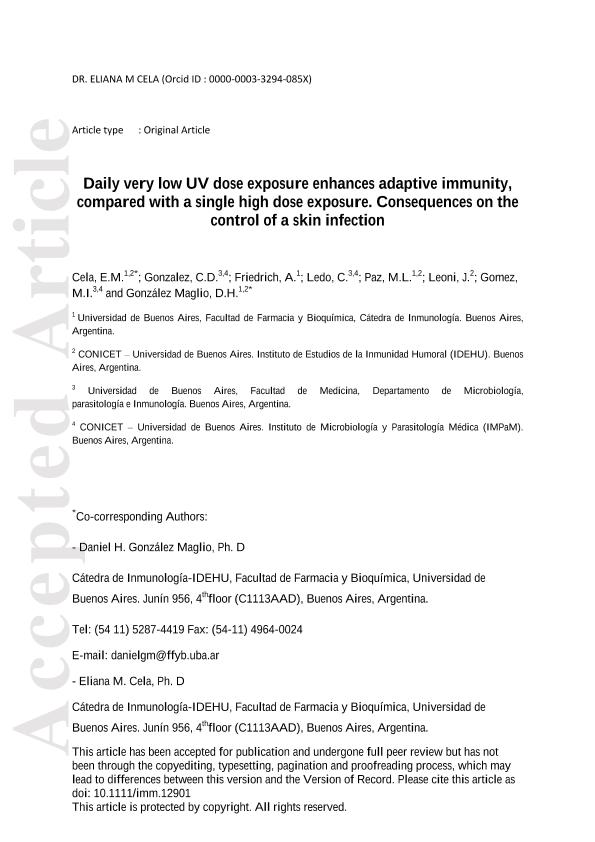Artículo
Daily very low UV dose exposure enhances adaptive immunity, compared with a single high‐dose exposure. Consequences for the control of a skin infection
Cela, Eliana Maiten ; Gonzalez, Cintia Daniela
; Gonzalez, Cintia Daniela ; Friedrich, Adrián David
; Friedrich, Adrián David ; Ledo, Camila
; Ledo, Camila ; Paz, Mariela Laura
; Paz, Mariela Laura ; Leoni, Juliana
; Leoni, Juliana ; Gomez, Marisa Ines
; Gomez, Marisa Ines ; Gonzalez Maglio, Daniel Horacio
; Gonzalez Maglio, Daniel Horacio
 ; Gonzalez, Cintia Daniela
; Gonzalez, Cintia Daniela ; Friedrich, Adrián David
; Friedrich, Adrián David ; Ledo, Camila
; Ledo, Camila ; Paz, Mariela Laura
; Paz, Mariela Laura ; Leoni, Juliana
; Leoni, Juliana ; Gomez, Marisa Ines
; Gomez, Marisa Ines ; Gonzalez Maglio, Daniel Horacio
; Gonzalez Maglio, Daniel Horacio
Fecha de publicación:
07/2018
Editorial:
Wiley Blackwell Publishing, Inc
Revista:
Immunology
ISSN:
0019-2805
Idioma:
Inglés
Tipo de recurso:
Artículo publicado
Clasificación temática:
Resumen
Ultraviolet radiation (UVr) promotes several well‐known molecular changes, which may ultimately impact on health. Some of these effects are detrimental, like inflammation, carcinogenesis and immunosuppression. On the other hand, UVr also promotes vitamin D synthesis and other beneficial effects. We recently demonstrated that exposure to very low doses of UVr on four consecutive days [repetitive low UVd (rlUVd)] does not promote an inflammatory state, nor the recruitment of neutrophils or lymphocytes, as the exposure to a single high UV dose (shUVd) does. Moreover, rlUVd reinforce the epithelium by increasing antimicrobial peptides transcription and epidermal thickness. The aim of this study was to evaluate the adaptive immune response after shUVd and rlUVd, determining T‐cell and B‐cell responses. Finally, we challenged animals exposed to both irradiation procedures with Staphylococcus aureus to study the overall effects of both innate and adaptive immunity during a cutaneous infection. We observed, as expected, a marked suppression of T‐cell and B‐cell responses after exposure to an shUVd but a novel and significant increase in both specific responses after exposure to rlUVd. However, the control of the cutaneous S. aureus infection was defective in this last group, suggesting that responses against pathogens cannot be ruled out from isolated stimuli.
Archivos asociados
Licencia
Identificadores
Colecciones
Articulos(IDEHU)
Articulos de INST.DE EST.DE LA INMUNIDAD HUMORAL PROF.R.A.MARGNI
Articulos de INST.DE EST.DE LA INMUNIDAD HUMORAL PROF.R.A.MARGNI
Articulos(IMPAM)
Articulos de INSTITUTO DE INVESTIGACIONES EN MICROBIOLOGIA Y PARASITOLOGIA MEDICA
Articulos de INSTITUTO DE INVESTIGACIONES EN MICROBIOLOGIA Y PARASITOLOGIA MEDICA
Articulos(SEDE CENTRAL)
Articulos de SEDE CENTRAL
Articulos de SEDE CENTRAL
Citación
Cela, Eliana Maiten; Gonzalez, Cintia Daniela; Friedrich, Adrián David; Ledo, Camila; Paz, Mariela Laura; et al.; Daily very low UV dose exposure enhances adaptive immunity, compared with a single high‐dose exposure. Consequences for the control of a skin infection; Wiley Blackwell Publishing, Inc; Immunology; 154; 3; 7-2018; 510-521
Compartir
Altmétricas



